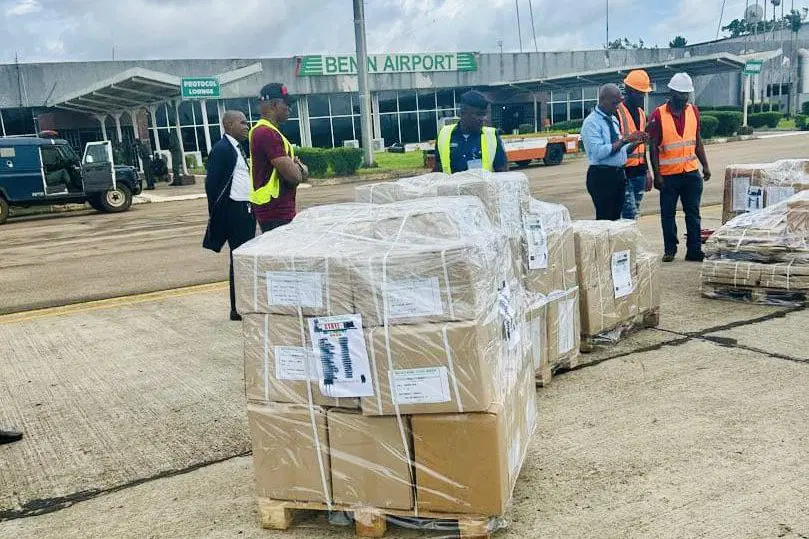In a pivotal moment for Edo State’s democratic process, the Independent National Electoral Commission (INEC) commenced the distribution of sensitive materials for Saturday’s governorship election in the early hours of Thursday. This critical operation, unfolding at the Central Bank of Nigeria (CBN) premises in Benin City, marks the final countdown to what promises to be a closely watched electoral contest.
As dawn broke over Benin City on Thursday, September 19, 2024, the usually serene environs of the Central Bank of Nigeria on Akpakpava Road burst into a hive of activity. INEC officials, security personnel, and accredited observers converged on the location, their faces etched with determination and focus.
State Resident Electoral Commissioner, Onuoha Anugbum, arrived at the scene at precisely 6:30 AM, his presence signaling the imminent start of this crucial operation. We are here, we have commenced the distribution of sensitive materials to the local government areas,” Anugbum confirmed to the throng of journalists gathered at the CBN entrance.

The atmosphere was charged with anticipation as INEC staff meticulously sorted and prepared the materials for dispatch to Edo’s 18 local government areas.
The sight of dozens of hired vehicles, lined up in neat rows beside the CBN building, underscored the massive logistical undertaking at hand. Each vehicle, destined for a specific local government area, stood ready to transport ballot papers, result sheets, and other sensitive electoral materials.
Security was visibly tight, with a joint team of police, military, and civil defense personnel forming a protective cordon around the distribution point. ASP Mohammed Ibrahim, the police liaison officer for the election, emphasized the importance of this security arrangement. “Our mandate is clear – to ensure the safe and timely delivery of these materials to their designated locations. We’re leaving nothing to chance,” he stated firmly.
The high-stakes nature of the operation inevitably led to some disruptions in the heart of Benin City. The usually bustling Ring Road area found itself in the grip of an unusual gridlock as authorities restricted traffic flow to manage the sensitive operation.
Local taxi driver Osaro Osamwonyi voiced the frustration felt by many commuters: “This traffic is crazy! I’ve been stuck here for over an hour. But I guess it’s the price we pay for democracy, abi?”
Despite the inconvenience, there was a palpable sense of excitement among bystanders. Market woman Blessing Osagie, pausing on her way to her stall, remarked, “It’s good to see INEC working hard. We’re ready to vote and choose our next governor!”
The distribution process quickly turned into a media spectacle, with hundreds of journalists from both print and electronic outlets descending upon the CBN premises. The clamor for interviews and the best camera angles created a carnival-like atmosphere, in stark contrast to the serious nature of the task at hand.
Veteran political reporter Aisha Muhammed of the Edo Chronicle noted the significance of the moment. “In my 20 years covering elections, I’ve never seen such intense media interest in the distribution of materials. It speaks to the high stakes of this particular governorship race.”
INEC’s decision to conduct the distribution in full view of the media and accredited observers was widely seen as a commitment to transparency. Dr. Innocent Okpoku, a political scientist from the University of Benin, praised this approach: “By opening up this process to scrutiny, INEC is building trust in the electoral system. It’s a positive step towards ensuring a free and fair election.
Commissioner Anugbum took time to address concerns about the integrity of the materials. Every single item has been meticulously accounted for,” he assured. “From the special watermarks on the ballot papers to the unique serial numbers on the result sheets, we’ve implemented multiple layers of security to prevent any form of manipulation.”
As the morning wore on, the urgency of the operation became increasingly apparent. With just 48 hours until polls open, INEC faces a race against time to ensure that every polling unit across Edo State’s vast territory receives its allotted materials.
Local Government Electoral Officer for Oredo LGA, Mrs. Fatima Abdullahi, highlighted the challenges ahead. “Once we receive our materials, we still need to distribute to the ward level, and then to individual polling units. It’s a complex operation, but we’re prepared for it.”
Representatives from the major political parties were also present at the CBN, keenly observing the proceedings. John Osakwe, an agent for one of the leading parties, expressed cautious optimism: “So far, the process looks orderly. We’ll be vigilant every step of the way to ensure there are no irregularities.”
This sentiment was echoed by observers from civil society organizations. Nkem Adebiyi of the Edo Election Monitoring Group noted, “The transparent nature of today’s exercise is commendable. We hope this level of openness continues throughout the voting and counting process.”
As the last of the materials were loaded onto waiting vehicles around midday, there was a collective sense of a major hurdle overcome. However, all involved recognized that this was just the beginning of a critical 48-hour period that will shape the future of Edo State.
Commissioner Anugbum, visibly tired but resolute, offered these final words: “Today’s exercise has been successful, but our work is far from over. I urge all Edo citizens to remain calm, vigilant, and ready to participate in this historic election. INEC is committed to delivering a process that truly reflects the will of the people.”
As the convoy of vehicles began to depart the CBN premises, carrying with them the tools of democracy, the people of Edo State – from the bustling streets of Benin City to the farthest rural communities – prepare for a weekend that promises to be a watershed moment in their political history.
With the sensitive materials now on their way to every corner of the state, the stage is set for an election that will not only determine Edo’s leadership for the next four years but also serve as a critical test of Nigeria’s democratic maturity.



